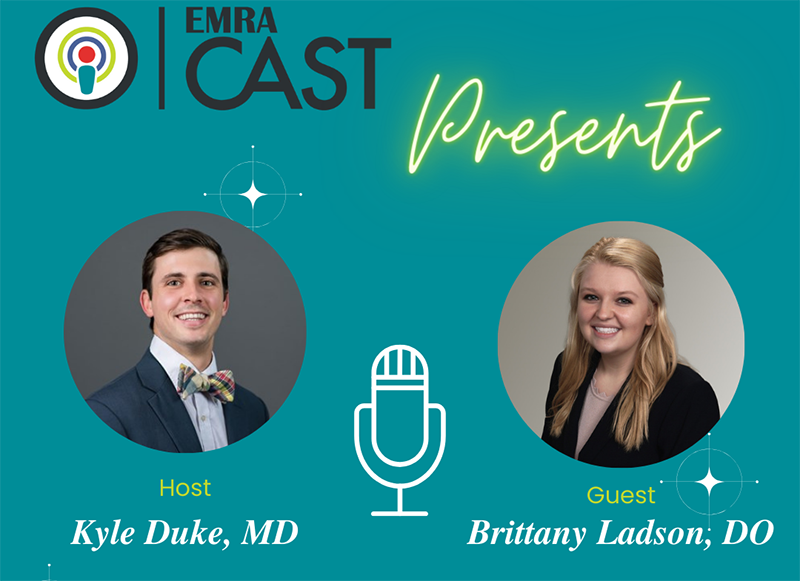ToxTalk: The Dangers of Delta-8
ToxTalk: The Dangers of Delta-8
Sept. 15, 2023
Join Brittany Ladson, DO, and host Kyle Duke, MD, for some ToxTalk fun, talking about the differences between and the risks and dangers of tetrahydrocannabinol, Delta-9 THC, and Delta-8 THC. Be sure to check out Dr. Ladson's article in EM Resident for a deeper dive.
Host
Kyle Duke, MD
Prisma Health - Greenville
EMRA*Cast Episodes
Guest
Overview
Join Brittany Ladson, DO, and host Kyle Duke, MD, for some ToxTalk fun, talking about the differences between and the risks and dangers of tetrahydrocannabinol, Delta-9 THC, and Delta-8 THC. Be sure to check out Dr. Ladson’s article in EM Resident for a deeper dive.
TAKE-HOME POINTS
What is Delta-8?
Delta-8 tetrahydrocannabinol, or Delta-8 THC, is a psychoactive substance found in the cannabis sativa plant. It is different than CBD or Delta-9. CBD is used for pain, anxiety, and insomnia relief. Delta-9 is the most common form in cannabis and is for euphoria, relaxation, and pain relief. Both Delta-8 and Delta-9 bind to the cannabinoid receptor (CB1). Delta-8 binds less than Delta-9. To get the same effects as Delta-9 with Delta-8, you need to give a higher dose.
What is the origin of Delta-8?
Delta-8 THC is found in cannabinoids but it is not naturally at a high concentration. To get higher concentrations, it is manufactured from hemp- derived cannabidiol. It is synthetically converted. There are concerns about the way synthesis is performed. It uses unsafe household chemicals and additional products may be used to make the color of the final product. According to the U.S. Cannabis Council, manufacturing of delta-8 may occur in uncontrolled or unsanitary settings, which leads to more potential contaminants. Some contaminants are other cannabinoids, delta-9, heavy metals, lead, and mercury. These products can be purchased online (with advertising enticing to children) or in gas stations, where the age limits on products may not be enforced. It is claimed that delta-8 is legal at the federal level because of loopholes in chemical regulations. The 2018 Farm Bill legalized hemp containing less than 0.3% delta-9 THC. That means the federal level allows for products containing higher amounts of delta-8 THC, as long as they come from hemp that doesn't have more than 0.3% delta-9 THC based on dry weight. However, delta-8 THC doesn't naturally occur in large amounts in hemp plants. That means that delta-8 is largely made by converting cannabidiol, or delta-9 THC, into delta-8 THC synthetically, which is illegal.
What are the intended effects of Delta-8?
Delta-8 produces psychoactive and intoxicating effects similar to Delta-9, creating a "high" when using cannabis. It can produce euphoria, relaxation, and potential pain relief (although generally a lot milder than Delta-9). However, these are all speculative because it has not been formally researched. Delta-9 is much better understood by researchers.
Why is Delta-8 Harmful?
These products have not been evaluated or approved by the FDA for safe use in any context. Because the FDA has not evaluated them, they may have different levels of Delta-8 in them. Some are labeled with "hemp," which can be associated with non-psychoactive products. Some are marketed as therapeutic or medical, which are unsubstantiated claims. This deceptive marketing of unproven treatments is also harmful because people will use the "hemp" products over their approved therapies because they believe it is a "better, more natural alternative" approach to their condition. Further, they are packaged into gummy bears, brownies, candies, and other foods so they are very enticing to children and pets.
What are the effects of Delta-8?
Ingestion of Delta-8 can lead to hallucinations, vomiting, tremors, anxiety, dizziness, confusion, red eyes, dry mouth, rapid heart rate, trouble with coordination, slowed reaction times, memory loss, and loss of consciousness. Some claim it is the next big thing in cannabis because it is a gentler and legal high that offers relaxation and pain relief without the anxiety or fuzzy-headedness of regular weed. The National Poison Control Center received 2,362 exposures between Jan. 1, 2021, and Feb. 28, 2022. Cases date back to 2010; 40% involved unintentional exposure to Delta-8, and 82% of these unintentional exposures affected pediatric patients. Most alarming, 8% required admission to a critical care unit, and 1 pediatric case was coded and died. Additionally, Animal Control has reported an increase in accidental exposure.
What do emergency docs need to know about Delta-8?
By itself, Delta-8 will not create a positive drug test. No medical research to determine how long it is in your system. However, Delta-8 is often contaminated with Delta-9, so it may be positive on a drug test. Concern this in an undifferentiated comatose patient.
MORE RESOURCES
- Ladson B. The Dangers of Delta-8. EM Resident. Online ahead of print. Sept. 2023.
- U.S. Food & Drug Administration. 5 Things to Know about Delta-8 Tetrahydrocannabinol – Delta-8 THC. May 2022. Also available at https://www.ncbi.nlm.nih.gov/pmc/articles/PMC9312454/.
- Kelly T. Synthetic Cannabinoids Highlight the Need to Abandon the War on Drugs. EM Resident. 2022;49(3):40.
- Cleveland Clinic. What You Need to Know about Delta-8. March 3, 2023.





